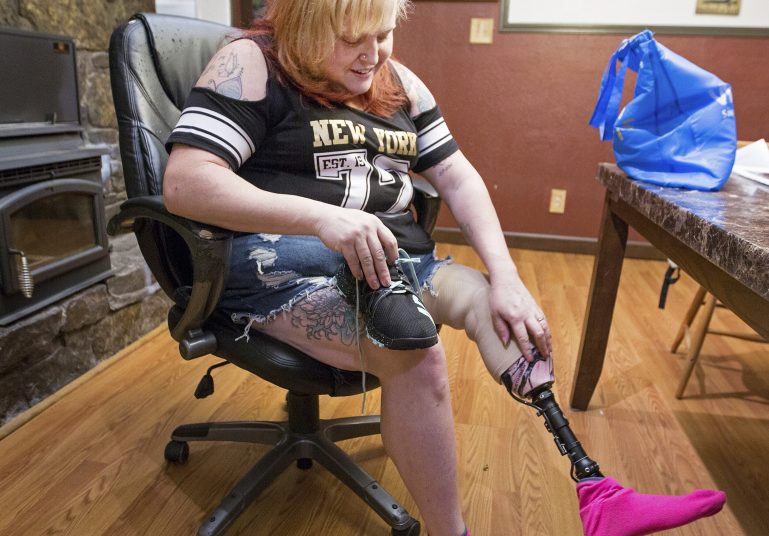A federal judge suggested Wednesday that a Veterans Administration podiatrist accused of providing substandard care to dozens of patients at the Togus VA hospital may have concealed vital information from his patients, which could allow six lawsuits against the VA to go forward.
U.S. District Court Judge Jon D. Levy ruled nearly two years ago that the cases had been filed too late to proceed. But he said he would allow the lawsuits to go forward if lawyers for the veterans accusing the podiatrist of malpractice could prove that VA officials had fraudulently concealed the evidence of substandard care.
During a two-hour hearing in Portland on Wednesday, Levy seemed to suggest several elements of the malpractice case could also show fraudulent concealment by Dr. Thomas Franchini.
Levy said Franchini performed unnecessary surgeries, lied about the outcome of those surgeries and falsified medical records to cover it up. That suggests Franchini, rather than other VA officials, may have concealed evidence of malpractice, Levy said. If Levy rules that way, the lawsuits could go to trial.
The six veterans, who sued in 2013 and early 2014, were among dozens of patients told by VA officials that a lengthy review of Franchini’s cases indicated that he provided substandard care during his six years at Togus. The VA called it a “mass disclosure event” because nearly 100 patients had to be alerted to the poor care and what their treatment options were going forward.
One veteran, April Wood, who filed the first lawsuit, had her leg amputated below the knee by other surgeons who concluded it was the only way to relieve unrelenting pain she suffered after two unsuccessful surgical procedures on her ankle by Franchini. Others who have sued say they still have difficulty walking and deal with pain because of botched surgeries or other deficiencies in their care.
Most of the arguments prior to the hearing had focused on possible concealment by VA hospital officials, who had uncovered cases where Franchini had given patients poor care in 2010 but didn’t tell the patients until early 2013. In affidavits filed in the suits, the VA officials, several of whom who where disciplined for their roles in the investigation, admit that they dealt with the cases slowly, but said they weren’t trying to keep the information from the patients in order to avoid lawsuits against the agency.
Although Franchini is mentioned throughout the documents filed in the case and the VA admits his care was poor, the federal government, not the doctor, is the defendant in the suits.
Franchini was forced to resign in 2010. He eventually let his medical license in Maine lapse and left the state, recently joining a podiatry practice in New York City. After stories in the Portland Press Herald and other publications about the lawsuits, Franchini left the practice. The office manager of 33 Fifth Avenue Podiatry refused to discuss Franchini or say why he left the practice.
Wood’s lawyer, T. Evan Fisher, said the federal government’s position has been that the investigation wasn’t handled competently, but officials didn’t try to delay it so those who were given poor care by Franchini could no longer file suits.
“We’re a big bloated bureaucracy and we just couldn’t do it,” was Fisher’s characterization of the VA’s explanation before Levy Wednesday.
Under Maine law, people have three years from when malpractice occurs to file suit. Since many of the problem cases occurred in the mid-2000s, that limit expired for many of Franchini’s patients even before he resigned and the VA investigation began in 2010, and had run out for all the patients by the time the VA informed them of the problems in January 2013.
But Levy’s characterization of events seemed to suggest that fraudulent concealment could have begun when Franchini was treating the veterans.
The VA admits that Franchini provided substandard care, from being overly aggressive with surgery in some cases to implanting the wrong plates and screws or poorly positioning the hardware during surgery in others. Many of the veterans were left with continuing pain and difficulty walking.
After the problems were disclosed, veterans were told that they could apply to the VA for re-evaluations of their disabilities, which could have resulted in higher retirement pay and guarantees of continued treatment, but most of those claims were denied.
Levy said he will issue a written ruling in the case, although he didn’t indicate when.
If he again rules against the veterans, their lawyers have indicated they will appeal to a federal appeals court in Boston, focusing on Levy’s decision that the Maine time limit had expired and his use of a Maine malpractice law instead of a federal law under which to try the suits. The federal law has a shorter statute of limitations – two years – but the time limit begins when alleged malpractice is discovered, rather than when it occurred.
Edward D. Murphy can be contacted at 791-6465 or at:
emurphy@pressherald.com
Send questions/comments to the editors.




Comments are no longer available on this story